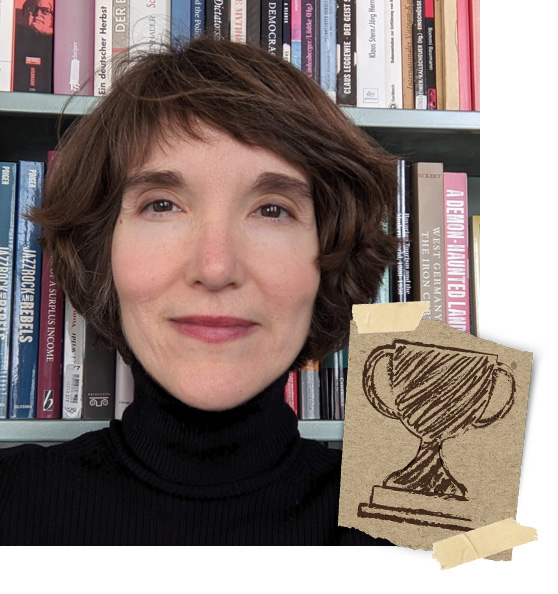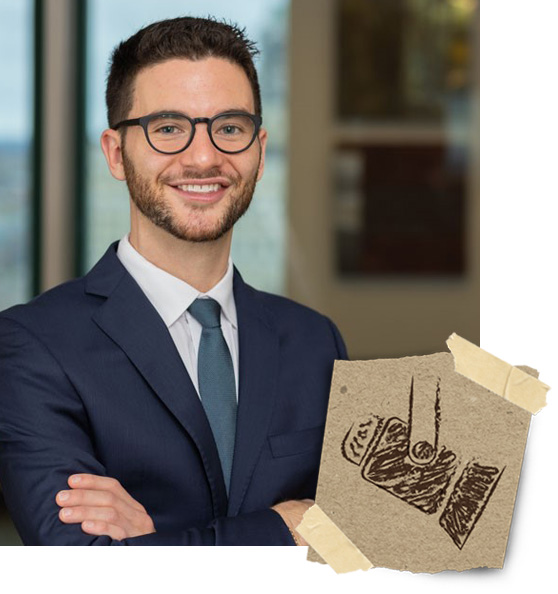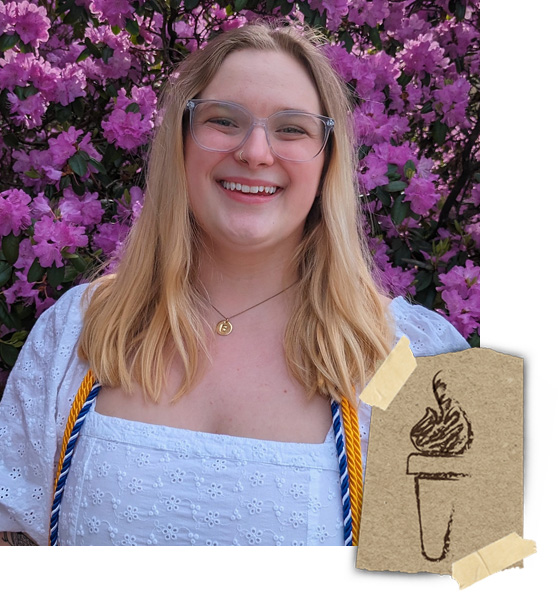Access Champion: Dr. Karrin Hanshew
January 22, 2025 - Emily Jodway
 Karrin Hanshew, Associate Professor in the Department of History, is our Access Champion for the month of January. As a historian of modern Europe with a focus on Germany and its political and economic reconstructive efforts in the wake of World War II and the Nazi reign, she is an integral part of students’ education on the consequences of fascism and joining together as a society to combat injustice and everyday threats to democracy. She is also committed to both preserving the memory of the Holocaust and reminding us that history can repeat itself, that prejudice and discrimination can take hold of a country before our eyes if we do not remain active and informed within our communities.
Karrin Hanshew, Associate Professor in the Department of History, is our Access Champion for the month of January. As a historian of modern Europe with a focus on Germany and its political and economic reconstructive efforts in the wake of World War II and the Nazi reign, she is an integral part of students’ education on the consequences of fascism and joining together as a society to combat injustice and everyday threats to democracy. She is also committed to both preserving the memory of the Holocaust and reminding us that history can repeat itself, that prejudice and discrimination can take hold of a country before our eyes if we do not remain active and informed within our communities.
Hanshew is a Midwesterner at heart, growing up in Nebraska before heading to St. Olaf College in Minnesota. She was raised with a multicultural worldview, by parents who both were foreign language teachers of German and Spanish, and who frequently housed German exchange students. Hanshew herself spent time in Germany on a Fulbright scholarship and as a SSRC Berlin Program fellow before earning a PhD in European History from University of Chicago. She joined the faculty at MSU in 2006 and has had the opportunity to live and research in Germany and Italy in the intervening years.
In some ways, Hanshew says, “it’s kind of astonishing how set I was on history pretty much from the beginning.” She majored in history as an undergraduate and has never regretted it. Her research focuses on postwar political and social reconstruction, particularly the efforts undertaken by ordinary Germans to rebuild their society following World War II and fascism. Her very first book, “Terror and Democracy in West Germany,” takes a look at some of the student protest and terrorist groups that developed in this context in the late 1960s and 1970s.
“It’s about a younger generation grappling very seriously with the question of how we achieve ‘Never Again,’” she explained. “Preventing the Holocaust from reoccurring, believing they lived in a fascist society, and having sworn that they would never allow history to repeat itself.”
The big question of how, exactly, Europeans, average people not unlike us, picked up the pieces and reconstructed their lives and relationships after 1945 is something Hanshew is particularly interested in. “Especially if you are committed to living in a democratic society, how to reestablish civil relations between people and countries,” relations broken by war and horrendous acts of violence, “not to mention all the nuts and bolts of building [an egalitarian] government,” is no small thing. According to her, we still have a lot to learn about the transition from wartime to peacetime, especially at the emotional and interpersonal level necessary for establishing a lasting peace.
“When the Allies turned the reins back over to Germans in 1949, there were still a lot of German citizens thinking that Nazism was a good idea, just badly implemented,” Hanshew said.
“I’m definitely fascinated by [the question of] how to prevent Nazism or fascism,” she added. “It’s really about reestablishing trust, a sense of one’s own humanity … you basically need people to start looking at each other as humans again. So if the Germans and others have succeeded in doing that, how did they do it? And how do they live with the legacy of the violence that they were all (directly or indirectly) participants in?”
The legacy of violence comes up often in Hanshew’s classes covering the Nazis, the history of the Holocaust and in her European history seminars. One of her favorite parts of teaching is getting the opportunity to connect with her students and educating them on events from the past while weaving in lessons from the present that tie into these topics. Getting to teach on the Holocaust and fascism in particular gives Hanshew the chance to, as she puts it, “take things that students know some things about, but also may have half understandings and misconceptions about, and kind of fill in those gaps.”
“Part of why I find it important to teach these things now is to restore some meaning to the concept; fascism was a thing, and it still is a thing, and I want my students to know that,” she said. “I’m very interested in questions of democracy, and fascism is clearly a threat to democratic society, a society of tolerance and multiculturalism.”
Hanshew also believes that this history can enlighten students on the concept of mass social movements, and that it takes all of us to combat societal issues like antisemitism, racism and hate speech. One of her goals when teaching about the Holocaust is to emphasize the incremental nature of discrimination. The Holocaust is often seen as a major event that no one saw coming and could not be prevented, but in reality, the circumstances that made genocide possible began much earlier.
“One of the really important things to underscore is that it was a long process,” Hanshew explained. “There are any number of different roads that could have been taken, and I want to draw my student’s attention to that. I hope what they get out of this is recognizing the everyday reality rather than the exceptional nature of racism and prejudice. It wasn’t just a cabal of a couple evil Nazis. It was millions and millions of people going along with the project that the Nazis floated.”
After students leave Hanshew’s class, she hopes they can recognize both the similarities and differences between the past and present, and what they can do with this knowledge today, using the tools that they gained in class. Several of today’s current headlines can be viewed through the lens of past events, and history can often teach valuable lessons on solving some of these issues.
“Learning about this history can actually then place the Holocaust and antisemitism in conversation with other forms of racism, and that’s another reason why I think it’s so important to teach this,” Hanshew said. “A class I am going to be teaching on fascism, the question that I want us all to hopefully be willing to work through is, how much of these [current movements] have a whiff of what we saw before, and how much can we actually say are genuine versions of it?”
As for how we can put some of these thoughts into action, Hanshew says that is the question we are still working to find an answer to today. But in the meantime, her advice to her students is this: “Stay informed and be active. If you are afraid of or concerned about rising social and racial injustice … don’t be passive. That’s certainly what the history of the Holocaust and Nazi Germany teaches us; not every German was an antisemite, but it takes serious civic courage to actually intervene on someone’s behalf when it’s a lot safer and more comfortable for you to do nothing.”
In January, around Holocaust Remembrance Day, Hanshew encourages us to take time to reflect on lessons we have learned on the importance of tolerance and finding space for diversity and inclusion of cultures different than ours. Some of these lessons we may have already put into use, and some we may need to put more work or focus into. She suggests honoring survivors, whether it be by reading a memoir or listening to their testimony, but also remembering all the people who did not survive, the millions who died and whose particular experiences are in many ways lost to us. She circles back to the idea of never forgetting, and how important this history still is today.
“The growing distance between the Holocaust and its crimes are allowing a far right to emerge and say things, do things, that would have been considered taboo 10-20 years ago,” she said. “I think it’s the comfort of time [passing], and Holocaust memory becoming sort of institutionalized and losing some of its visceral quality. It’s becoming old history, and we need to do a better job of keeping it alive.”
Honorees’ views are their own and do not necessarily reflect those of the College of Social Science.
Read more:

Access Spotlight
Alumni
Daniel Baum
Our Access Spotlight this month is on Daniel Baum, an Attorney at the Jones Day law firm in Detroit, and a proud alumnus of the College of Social Science with a degree in Public Policy and a minor in Jewish Studies. His maternal grandparents both are survivors of the Holocaust.

Access Torch
Student
Emily Hamel
Emily Hamel is a fall 2024 graduate of the Human Development and Family Studies (HDFS) program with a minor in Jewish Studies, as well as our Access Torch for the month of January. Hamel is passionate about both early childhood education and Jewish history and culture.

Diversity Matters
We strive to cultivate an inclusive and welcoming college environment that celebrates a diversity of people, ideas, and perspectives.

